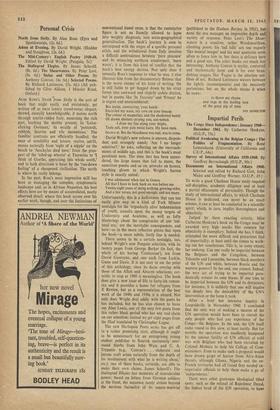Personal Crisis
ALAN Ross's North from Sicily is the sort of book that might easily, and mistakenly, get written off as mere luxury travel-verse; elegant, shrewd, casually knowledgeable, it moves north through tourist-ridden Italy, mourning the rich past, loathing the shabby present, its `Leica- clicking Germans,' its wealth of 'postcards, rubbish, Scarves and vile mementoes.' The familiar contrasts are efficiently handled; the man of sensibility and leisure, restive, adrift, moves naturally from 'sight of a nipple' on the beach to 'Aeschylus died here,' from the pros- pect of the 'oiled-up whores' at Taormina to 'I think of Goethe, appraising this whole south,' and in both directions is beset by the 'run-down feeling' of a cheapened civilisation. The north is where he really belongs.
In the past, Ross's most impressive skill has been at managing the complex, symptomatic landscape and, as in African Negatives, his best effects here are by means of accumulated, neatly observed detail; where this book scores over his earlier work, though, and over the limitations of
ANDREA NEWMAN
Author of 'A Share of the World' ,,,-----,-:-
'f'----'--
her new novel 1 \ Mirage
The hopes, excitements and eventual collapse of a young marriage.
'The tone of Mirage—hesi- tant, troubled, self-question- ing, brave—is perfect in its authenticity and the result is a small but beautifully mov- ing book.'
SUNDAY TELEGRAPH 18S
BODLEY HEAD
conventional travel verse, is that the cumulative figure is not so fluently allowed to lapse into weighty diagnosis, into socio-geographical generalisation. The book's journey is seen to correspond with the stages of a specific personal crisis, and the withdrawal from Italy involves a difficult ambivalence between 'pure pleasure' and its menacing northern counterpart, 'mere waste'; it is from this kind of conflict that the book's best energy derives. Not only does it intensify Ross's response to what he sees, it also liberates him from the documentary flatness that is the worst enemy of his kind of writing. He is still liable to get bogged down by his strict forms into awkward and slightly sedate diction, but in poems like 'In Tuscany' and 'Fresco' he is urgent and unencumbered:
But inside, contracting, your hands Encircled my waist, my own on your breasts The colour of magnolias, and the shadowed bands Of drawn shutters striping you, sun-netted.
I draw my lips along your thighs.
Taste salt, your pale moist hairs. My head rests.
Invoca te. But the bloodiness was real, was to come.
David Wright's new volume is uneven, despon- dent and strangely numb; 'Am I no longer sensitive?,' he asks, reflecting on the encroach- ments of middle age, and this is the book's most persistent note. The time that has been squan- dered, the large issues that fail to move, the unwritten poems and so on, provoke an honest, touching gloom to which Wright's barren style is exactly suited:
I was adolescent when last in Genoa.
All that 1 have to look back on was before me. Twenty-eight years of doing nothing, growing older, And a few verses, not good enough, and not many.
Unfortunately, this is a hollowness that can too easily give way to a kind of York Minster nostalgia for the 'organically alive' bohemianism of youth; assaults upon the mossy targets of Uniformity and Academe, as well as lofty blusterings about the conspiracies of our 'cul- tural era,' are the inevitable consequences, and here—as in the more reflective pieces that open the book—a more subtle, lively line is needed.
There seems to be a certain nostalgia, too, behind Wright's new Penguin selection, with its twenty pages from George Barker (in fact, the whole of his boring 'Confession), ten from David Gascoyne, and one each from Larkin, Gunn and Davie. It is not easy to see the point of this anthology, since its dates overlap with those of the Allott and Alvarez selections; cer- tainly to stop at 1960 is meaningless. The book does give a new lease of life to forty-ish roman- tics and it provides a home for refugees from X Review, but as a representation of the best work of the 1940s and 1950s it is absurd. Not only does Wright deal oddly with the poets he has included, but he has also chosen to leave out Alun Lewis, one of the very few poets from this rather bleak period who has any real claim on our attention; instead we get eight pages from the Iliad translated by Christopher Logue.
The new Harlequin Poets series has got off to a rather promising start, although it ought to be unnecessary for an enterprising young student publisher to flourish unctuously over- stated blurbs from John Wain and C. A. Trypanis (e.g., 'Conran's . . . elaborate and joyous craft arises naturally from the depth of his involvement with what he is writing about,' etc.); two of these books, certainly, are able to make their own claims. James Schevill's The Stalingrad Elegies has moments of considerable power; based on letters from German soldiers at the front, the sequence rarely strains beyond the nervous factualiof of its source-material
(published in the Hudson Review in 1961), but none the less manages an impressive depth and variety of response. Peter Levi's The Shear.' waters is a sensitive, rather Wordsworthian, climbing poem; his 'tall hills' are too vaguely 'like mental images' and his neat quatrains seem often to fence him in, but there is delicacy here and a good eye. The other books are much less interesting; Anthony Conran is mythy, contorted and rhythmically inept and is for ever bran- dishing slogans like 'Fugue is the absolute em- blem of art, Richard Lattimore wavers between the lightly inconsequential and the massively portentous, but on the whole means it when he vows :
to throw my rhyme
and rage in the feeding face of the great pig of time.
IAN HAMILTON


































 Previous page
Previous page